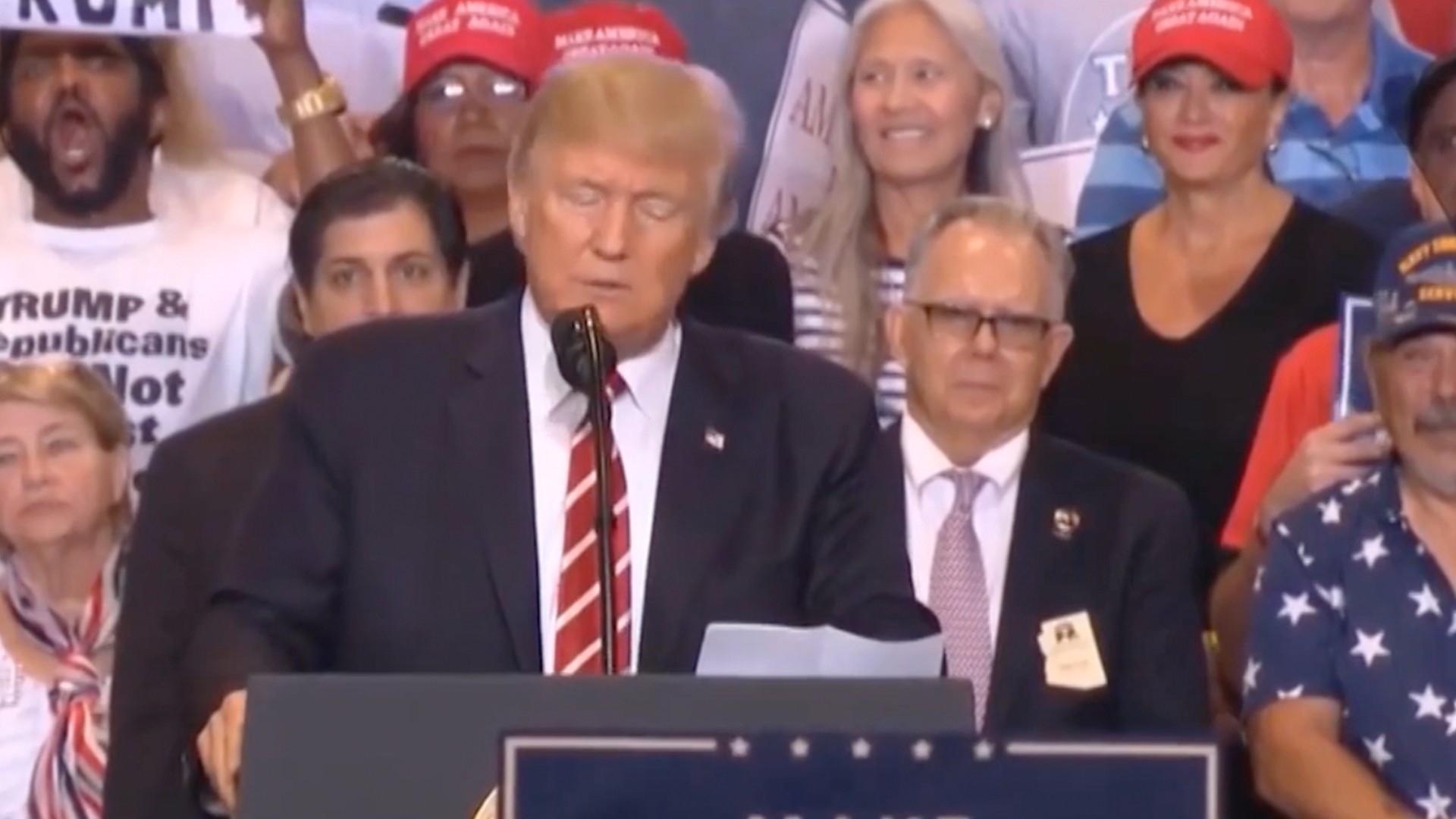New Jersey Democrat Robert Menendez faces trial for alleged bribery and fraud next week in a case with far-reaching implications for the future of corruption in America. But as disturbing as the charges against the veteran US senator may be, they harken back to a simpler time in American life, when ethics experts and advocates weren't constantly stressing out about conflicts of interest by a shameless profiteer in the White House.Menendez has steadfastly denied the federal charges that he performed political favors for his longtime friend Dr. Salomon Melgen, a wealthy Florida eye doctor in exchange for six-figure campaign donations, luxury gifts, and free international vacations. (Melgen is named as a co-defendant in the indictment.) The senator has entered a plea of "not guilty" on all counts, and is represented by Abbe Lowell, a veteran criminal defense lawyer who joined Jared Kushner's legal team this June. That confluence is a testament to the bipartisan shenanigans that have long been a fixture among the rich and powerful in New Jersey.The indictment describes a pattern of quid pro quo bribery ranging from the petty to the comically brazen, a grab bag of luxury gifts and campaign cash traded for unusual—even in the annals of Washington, DC—access to Menendez and his staff. Between 2006 and 2010, the feds say, Menendez took several lavish trips to the Dominican Republic on Melgen's dime. The senator apparently flew on the doctor's private plane and stayed at his villa in Casa de Campo, an exclusive resort frequented by Beyonce, Jay-Z, and Jennifer Lopez, where he enjoyed access to golf courses, polo fields, a spa, and the services of Melgen's private cooking staff. Melgen also gifted Menendez a Paris hotel suite worth $4,934.10, which he paid for with his American Express credit card points, according to the indictment. (Following a 2012 ethics complaint, Menendez reimbursed Melgen's business $58,500, which covered only two of the private flights.)Perhaps most glaringly, Melgen donated more than $790,000 on behalf of Menendez's political campaigns and a legal defense fund between 2010 and 2012. These payments were made by Melgen himself, his family members, and his business, Vitreo-Retinal Consultants of the Palm Beaches (VRC). During Menendez's 2012 reelection campaign, VRC donated some $600,000 to Senate Majority PAC, a Democratic fundraising committee, and earmarked the payments for Menendez's reelection bid. An additional $143,500 was paid out to state and county Democratic committees in New Jersey.In return, prosecutors charge, Menendez lobbied for Melgen's checkered private and professional interests, from securing visas for Melgen's foreign girlfriends (one was traveling to the US for a plastic surgery consultation) to leaning on the State Department to intervene in a Dominican port security contract dispute, as well as lobbying the Centers for Medicare and Medicaid Services (CMS) to overturn a $8.9 million over-billing charge. When Melgen had a problem, Menendez and his staff allegedly prioritized it. During the Medicare dispute in 2009, one staffer emailed Menendez, "As you know we've been working on the Melgen case everyday."
Desus & Mero debate the pronunciation of the punchiest left-wing buzzword.
Not that the senator's lobbying paid huge dividends. In his alleged campaign to save Melgen from the overbilling charge, Menendez is said to have roped in then-majority leader Harry Reid and argued Melgen's case in a "lively" meeting with HHS Secretary Kathleen Sebelius in 2012. But CMS did not drop its audit. In fact, the billing dispute ballooned into a federal investigation, and in 2015, Melgen was arrested on charges of defrauding Medicare of more than $90 million through false claims. This April, he was found guilty and could face 20 years in prison.For his part, Menendez faces serious prison time. And the trial may make it harder for the Senator to do his job in the meantime: His lawyers filed a motion last week to alter the trial schedule, allowing him to travel to Washington for important votes. Judge William Walls responded skeptically to an earlier and broader request, saying that the Menendez is free to "absent himself at times," but the trial will go on without him. "I will just tell the jury that the Senator has absented himself," Walls said of such a situation.But beyond the future of a mostly unremarkable politician, the case has potentially major ramifications for the government's ability to prosecute corruption cases in the future. Coming after a 2016 Supreme Court decision McDonnell v. US narrowed the legal definition of bribery, Menendez's case will serve as a bellwether for how courts apply the new standards.Convicting a public official of bribery requires the exchange of something of value for their influence in an "official act." The Supreme Court's opinion in McDonnell stated that a qualifying action must involve "a formal exercise of governmental power… Setting up a meeting, talking to another official, or organizing an event—without more—does not fit that definition of 'official act.'" The justices also contended that close relationships between politicians and their constituents are healthy for representative government, and suggested a stricter definition of bribery "could cast a pall of potential prosecution over these relationships."Adam Lurie, a former federal white-collar crime prosecutor in New Jersey, believes the McDonnell decision will help shape Menendez's legal strategy. "What Senator Menendez is likely to argue is: I didn't do what I did in exchange for anything the doctor gave me. I did it because he's my friend, and I believe in the causes that he was advocating." If Menendez can show his actions fall within the boundaries of the normal relationship between a constituent and their representatives, and (less likely) that he didn't have enough sway to perform "official acts" on Melgen's behalf, he could be acquitted, no matter how unseemly the gifts and donations might appear."Quid pro quo requires an articulated exchange," added Fred Werthiemer, president of the government watchdog group Democracy 21. Which is to say it's not enough to show that the timing of campaign donations coincided with political favors. "If [Melgen] were to testify that there were an exchange, that would be strong evidence. But absent one of the participants making that kind of testimony, it becomes a difficult proposition to prove that there was an exchange, and then the McDonnell case makes it difficult to prove that there was an official act.""We found the McDonnell decision wrong on its merits," Wertheimer added. "We have seen one example already of a bribery conviction that was overturned because of McDonnell, and that is a very ominous sign," he continued, referring to former NY State Assembly speaker Sheldon Silver, whose corruption conviction was overturned this July.Meanwhile, Menendez and Melgen's alleged deeds look like Little League next to unprecedented potential ethics violations that stem from President Trump's continuing ties to his business empire. Jeff Hauser, executive director of the Revolving Door Project at the Center for Economic and Policy Research, believes the Menendez allegations represent a more traditional breed of corruption than the Trump administration's brave new world of brazen self-dealing. "Trying to structure parts of the federal government to enrich various brands and the First Family is definitely unprecedented," he told me "There's a reason why the Emoluments Clause was obscure until a year ago. I think the allegations here on Menendez are more banal.""That isn't to say that they're great," Hauser added.If Menendez is acquitted, making corruption cases stick will look more daunting than ever. And if he's found guilty, Republicans could pick up an extra vote in the Senate, even though a senator is not automatically removed from office after being convicted. If Menendez resigns or is removed from office by his colleagues before mid-January, however, New Jersey governor Chris Christie—who when he isn't being mocked at sporting events is still an elected official with actual power—would be waiting in the wings to appoint his replacement. That could give the GOP another shot at repeal of the Affordable Care Act, which failed by one vote in July.Follow Erin Schwartz on Twitter.
Advertisement
Advertisement
Desus & Mero debate the pronunciation of the punchiest left-wing buzzword.

Not that the senator's lobbying paid huge dividends. In his alleged campaign to save Melgen from the overbilling charge, Menendez is said to have roped in then-majority leader Harry Reid and argued Melgen's case in a "lively" meeting with HHS Secretary Kathleen Sebelius in 2012. But CMS did not drop its audit. In fact, the billing dispute ballooned into a federal investigation, and in 2015, Melgen was arrested on charges of defrauding Medicare of more than $90 million through false claims. This April, he was found guilty and could face 20 years in prison.
Advertisement
Advertisement

